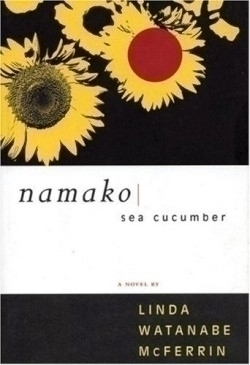Namako
Sea Cucumber
It is a very pleasant and all-to-rare occasion when a reviewer receives, unsolicited and unexpected, in its modest bound galley a truly exceptional book. Such was the case when Linda Watanabe McFerrin’s Namako arrived at my home in the morning mail. This finely-crafted first novel by an accomplished young writer fairly radiates with light and life. And, as it grows into its final crescendo of insight and enlightenment, it also radiates with power.
Namako tells the story of Ellen, 10 years old when the novel begins and 13 at its close. Ellen’s Japanese-American mother, Sarah, and her Scottish father, Gene, take their young family to Japan to live with her maternal grandmother. Ellen has two younger brothers, Samuel and Grey, and a little sister, Mimi. Though living in Japan, the children remain relentlessly American, going to American schools and playing with the loved and unloved children of the European colony of builders and engineers who are friends of her mother and father.
The contrast between unstructured, seemingly chaotic western energy and the ceremonial precision of Japanese life provides the backdrop against which Ellen’s own awareness begins to develop.
The Japanese characters that represent the word “namako” (sea cucumber), the author points out, can also be read as “raw child.” Both the namako — an unattractive marine organism that seems half-plant and half-animal — and the child are in a sense unfinished, halfway between one thing and another. This, of course, is standard fare for the traditional “coming-of-age” novel. But this book is much more than that. For what young Ellen comes into is not merely adulthood, but a sense of oneness with her Japanese ancestry, the Japanese land and through it, to the heart of life itself. What she experiences is an epiphany as complete and sure as that of Stephen Deadalus on the Irish beach or young Marcel entranced by the hawthorn in The Remembrance of Things Past. It is no accident that at the head of her book, the author has placed a quote from Yeats.
In the final pages, some weeks after the death of her grandmother, Ellen walks out into the countryside, where she encounters a spiritual presence (a kami) so great as to be overpowering. “It was as if the pieces of a puzzle had finally fallen together. At that moment I wanted to laugh… . I wanted to sing, and I wanted to dance. I wanted to celebrate wildly because out there in the fields, in the violence of spring, I had left the sadness and the severity of that ancient house and my mother’s mourning far behind me. I had found a kami, a kami who filled me with hope for my grandmother, for myself, for every part of the world, one who promised that the water would always turn clear. It seemed I had finally found a trail through the lies and the secrets. I had found a place to come back to, and I knew, at last, the way that I must go to get there.”
Though Namako is her first novel, McFerrin has been widely recognized for her short stories, and in 1997 received the Katherine Anne Porter Prize for Fiction. In this book, her style itself is a joy, each word perfectly accurate, yet not at all abstract or remote, but relaxed and informal enough to deal with a house full of rough-and-tumble children.
The designer of this book, Kelly Krofon, has done a beautiful job, choosing an Adobe Perpetua font that seems very right for the story, and a graceful, slightly-undersized page. Oh, for the days when the colophon at book’s end at least tipped a hat to the person who had put it all together.
(August)
Tom Williams, author of 11 books, is a former professor (20 years) of comparative literature. He is now the owner of Venture Press and editor of Pubmart Magazine: The How-To E-zine for Entrepreneurial Publishers (http://www.pubmart.com).
Reviewed by
Tom Williams
Disclosure: This article is not an endorsement, but a review. The publisher of this book provided free copies of the book to have their book reviewed by a professional reviewer. No fee was paid by the publisher for this review. Foreword Reviews only recommends books that we love. Foreword Magazine, Inc. is disclosing this in accordance with the Federal Trade Commission’s 16 CFR, Part 255.

